Published on November 22, 2021
Alzheimer’s Disease is a progressive brain disorder, NOT a normal part of aging. Share this information to help lower the risk and incidence of Alzheimer’s with nutrient research!
Key Points
- Alzheimer’s is a progressive brain disorder; more than 6.2 million Americans are living with Alzheimer’s, and the number of Americans with Alzheimer’s is projected to surpass 13.8 million by 2060
- There is a significant association between vitamin D deficiency and faster cognitive decline, as well as a 3-fold increase in the risk of Alzheimer’s disease among those with vitamin D deficiency and insufficiency
- Other nutrients that may help protect against Alzheimer’s disease and progression include magnesium, omega-3 fatty acids, B-vitamins, and probiotics
 November is Alzheimer’s Awareness Month. According to the Alzheimer’s Foundation of America
November is Alzheimer’s Awareness Month. According to the Alzheimer’s Foundation of America
- More than 6.2 million Americans are living with Alzheimer’s
- The number of Americans with Alzheimer’s is projected to surpass 13.8 million by 2060
- More than 11 million American caregivers provide over 15.3 billion hours of unpaid care
Most importantly,
- Alzheimer’s is a progressive brain disorder, NOT a normal part of aging
The “Facts About Alzheimer’s Disease” infographic below can be shared to help spread awareness about Alzheimer’s Disease. When sharing, however, awareness of PREVENTION should go hand-in-hand with awareness of disease incidence. Read below for a summary of research on how certain nutrients can have a protective role on brain health and cognition, and can help decrease the risk of Alzheimer’s Disease and other forms of dementia.
Share the Research!
Low vitamin D associated with increased long-term risk of dementia and Alzheimer’s disease
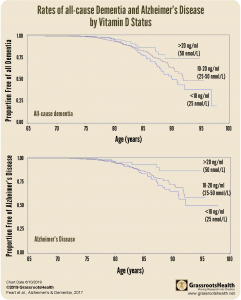 A 2017 study by Feart et al. looked at the association between vitamin D levels and risk of dementia in a French population consisting of 916 participants, aged 65 and older, whose measurements for vitamin D status and cognitive decline were tracked for 12 years. They found a significant association between vitamin D deficiency and faster cognitive decline, as well as a 3-fold increase in the risk of Alzheimer’s disease.
A 2017 study by Feart et al. looked at the association between vitamin D levels and risk of dementia in a French population consisting of 916 participants, aged 65 and older, whose measurements for vitamin D status and cognitive decline were tracked for 12 years. They found a significant association between vitamin D deficiency and faster cognitive decline, as well as a 3-fold increase in the risk of Alzheimer’s disease.
“Those participants with vitamin D deficiency [less than 10 ng/ml (25 nmol/L)] and insufficiency [less than 20 ng/ml (50 nmol/L)] had a significantly doubled risk of all-cause dementia. Associations appeared even stronger for the risk of [Alzheimer’s disease], with risks almost tripled in both deficient categories compared with sufficient concentrations.”
This is suggestive of a protective effect of vitamin D levels at or above 20 ng/ml (50 nmol/L) for brain health and a decreased risk of Alzheimer’s disease over time.
Lower Risk for Alzheimer’s Disease and Dementia with Higher Vitamin D Levels
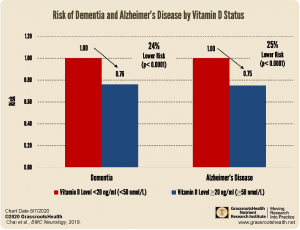 A 2019 meta-analysis by Chai et al. confirmed a significant association between higher levels of vitamin D (levels at or above 20 ng/ml or 50 nmol/L) and a decreased risk for both dementia and Alzheimer’s Disease. Data from a total of 21,784 participants in 11 different studies was included in the analysis for risk of dementia, while data from 14,618 participants in 6 different studies was analyzed for Alzheimer’s. The authors found an overall 24% lower risk of dementia and a 25% lower risk of Alzheimer’s for those whose vitamin D levels were at or above 20 ng/ml (50 nmol/L) compared to those with levels below 20 ng/ml.
A 2019 meta-analysis by Chai et al. confirmed a significant association between higher levels of vitamin D (levels at or above 20 ng/ml or 50 nmol/L) and a decreased risk for both dementia and Alzheimer’s Disease. Data from a total of 21,784 participants in 11 different studies was included in the analysis for risk of dementia, while data from 14,618 participants in 6 different studies was analyzed for Alzheimer’s. The authors found an overall 24% lower risk of dementia and a 25% lower risk of Alzheimer’s for those whose vitamin D levels were at or above 20 ng/ml (50 nmol/L) compared to those with levels below 20 ng/ml.
Magnesium Intake and Vitamin D Status May Help Prevent Cognitive Decline
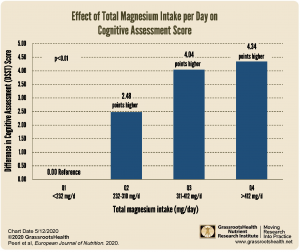 Using data from the National Health and Nutrition Survey (NHANES) 2011-2014, Peeri et al. studied the interaction between magnesium and vitamin D by assessing magnesium intake and serum vitamin D levels, and their association with cognitive decline in older adults. The analysis included 2466 participants ages 60 and older. The Digit Symbol Substitution Test (DSST), which measures cognitive performance by assessing executive function and processing speed, was used to identify and define the level of any existing cognitive impairment.
Using data from the National Health and Nutrition Survey (NHANES) 2011-2014, Peeri et al. studied the interaction between magnesium and vitamin D by assessing magnesium intake and serum vitamin D levels, and their association with cognitive decline in older adults. The analysis included 2466 participants ages 60 and older. The Digit Symbol Substitution Test (DSST), which measures cognitive performance by assessing executive function and processing speed, was used to identify and define the level of any existing cognitive impairment.
The authors found a significant association between magnesium intake and reduced odds of cognitive impairment for the third and highest quartiles of magnesium intake compared to the lowest (p trend <0.01), and similarly for the third and highest quartiles of vitamin D serum levels compared to the lowest (p trend=0.05). Compared to participants with the lowest magnesium intake amounts, participants with the highest intakes scored an average of 4.43 points higher on the DSST.
Omega-3 Fatty Acid Status Improves the Protective Effects of B Vitamins on Cognition
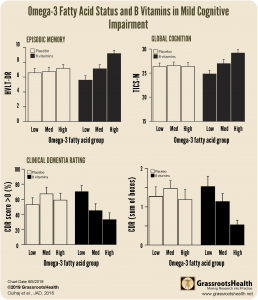 A 2016 randomized trial by Oulhaj et al. looked to see if omega-3 status has an influence on the effect of B vitamins on cognitive impairment. They enrolled 266 participants into the study, all of whom were at least 70 years of age and had mild cognitive impairment. Participants were randomized into either a high dose B vitamins (folic acid, B6, and B12) group or a placebo group for two years. Blood levels for several B vitamins, DHA, and EPA were measured at baseline and again at the end of the trial period, along with risk factors for Alzheimer’s disease.
A 2016 randomized trial by Oulhaj et al. looked to see if omega-3 status has an influence on the effect of B vitamins on cognitive impairment. They enrolled 266 participants into the study, all of whom were at least 70 years of age and had mild cognitive impairment. Participants were randomized into either a high dose B vitamins (folic acid, B6, and B12) group or a placebo group for two years. Blood levels for several B vitamins, DHA, and EPA were measured at baseline and again at the end of the trial period, along with risk factors for Alzheimer’s disease.
Outcomes were compared for those in the B vitamins group versus the placebo group based on baseline omega-3 status (broken into three roughly equal groups, low, medium, and high for the study population). Overall, significant benefits were found for those who had the higher baseline omega-3 fatty acid concentrations and who were in the B vitamin treatment group.
Those in the high omega-3 group who received B vitamins had
- improved episodic memory
- better global cognition scores
- lower ratings of dementia
With low omega-3 fatty acid concentrations, B vitamin treatment did not seem to slow cognitive decline in people with mild cognitive impairment. When omega-3 fatty acid levels were in the upper range of normal, the slowing effects of B vitamins on both brain atrophy and cognitive decline were enhanced.
This study supports previous evidence that the interaction of B vitamins and omega-3 fatty acids on brain atrophy and cognition results in the slowing down of the disease process in mild cognitive impairment.
Probiotics may help Improve C-Reactive Protein Levels in Alzheimer’s Patients
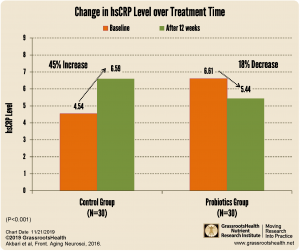 A 2016 randomized controlled trial by Akbari et al. followed 60 Alzheimer’s patients between the ages of 60 – 95 to determine whether probiotic supplementation had an effect on cognitive function and metabolic status. For 12 weeks, half of the participants received a probiotic milk mix that contained Lactobacillus acidophilus, Lactobacillus casei, Bifidobacterium bifidum, and Lactobacillus fermentum (the probiotics group), while the other half received regular milk (the control group). Before and after measurements for mental state (which was evaluated with the mini-Mental State Examination, or MMSE test), hsCRP, and other markers for metabolism and inflammation were completed.
A 2016 randomized controlled trial by Akbari et al. followed 60 Alzheimer’s patients between the ages of 60 – 95 to determine whether probiotic supplementation had an effect on cognitive function and metabolic status. For 12 weeks, half of the participants received a probiotic milk mix that contained Lactobacillus acidophilus, Lactobacillus casei, Bifidobacterium bifidum, and Lactobacillus fermentum (the probiotics group), while the other half received regular milk (the control group). Before and after measurements for mental state (which was evaluated with the mini-Mental State Examination, or MMSE test), hsCRP, and other markers for metabolism and inflammation were completed.
At the end of the 12 weeks, the probiotics group had an improvement in their MMSE score, while the control group had a worse MMSE score; the difference between the two groups was statistically significant. In addition, the probiotics group saw an 18% decrease in hsCRP levels, while the control group saw a 45% increase in hsCRP levels from the beginning of the 12 weeks to the end.
Make Sure You Are Getting Enough Vitamin D, Omega-3s, Magnesium & More
 Having and maintaining healthy vitamin D and other nutrient levels can help improve your health now and for your future. Choose which to measure, such as your vitamin D, omega-3s, and essential minerals including magnesium and zinc, by creating your custom home test kit today. Add hs-CRP to measure your level of inflammation as well. Take steps to improve the status of each of these measurements to benefit your overall health. You can also track your own intakes, symptoms and results to see what works best for YOU.
Having and maintaining healthy vitamin D and other nutrient levels can help improve your health now and for your future. Choose which to measure, such as your vitamin D, omega-3s, and essential minerals including magnesium and zinc, by creating your custom home test kit today. Add hs-CRP to measure your level of inflammation as well. Take steps to improve the status of each of these measurements to benefit your overall health. You can also track your own intakes, symptoms and results to see what works best for YOU.
Enroll and test your levels today, learn what steps to take to improve your status of vitamin D (see below) and other nutrients and blood markers, and take action! By enrolling in the GrassrootsHealth projects, you are not only contributing valuable information to everyone, you are also gaining knowledge about how you could improve your own health through measuring and tracking your nutrient status, and educating yourself on how to improve it.


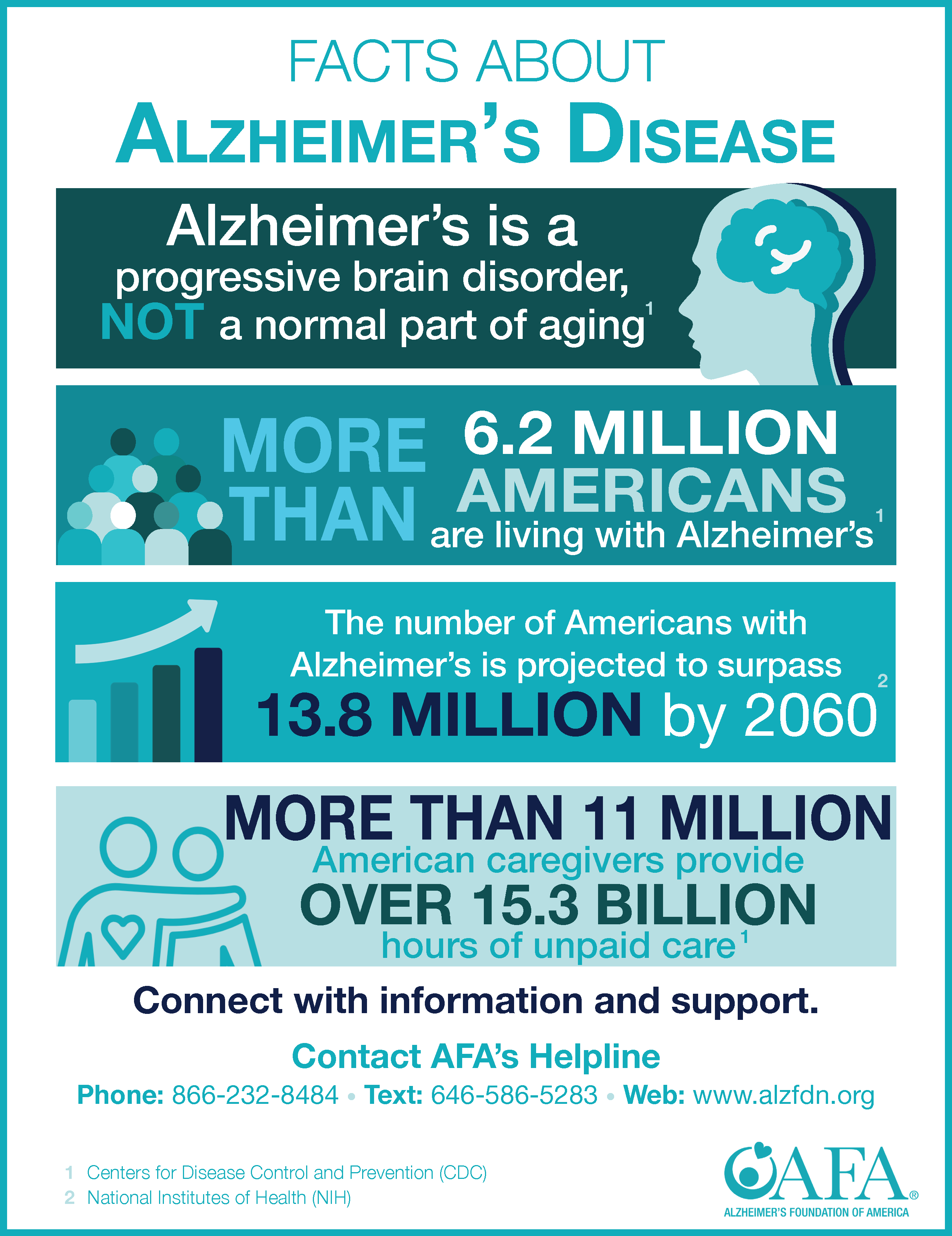 Click to Enlarge & Print
Click to Enlarge & Print


